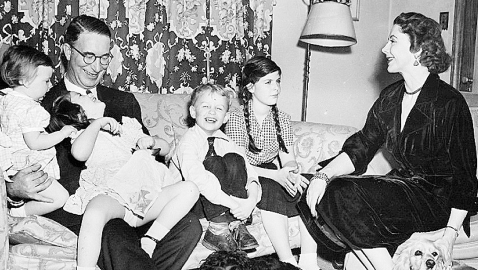This summer, Coach Tony Vitello led the UT Vols baseball team in a record-smashing season that ended 57-9. For most of the season, the Vols were ranked number one in the country, and they had 10 players selected in the major league draft, a new program record.
But we aren’t here to talk about the team’s records, nor to speculate about next season. Instead, we’re here to talk about howCoach Vitello took the Vols from the worst team in the conference to the best in the nation. What leadership strategies are responsible for his success? And what lessons can we learn from him that we can apply to our own businesses, families, teams, and anything else that requires leadership?
I interviewed Coach Vitello to ask him these questions. I sat in a conference room overlooking Lindsey Nelson Stadium. Across from me, dressed in orange, sat the coach of possibly the greatest baseball team in the country.
You set a lot of records, but I want to focus on how you did it. Are there principles and strategies our readers could apply to other areas of life?
Coach Vitello answered this first question in four parts.
Patience
“One thing that sticks out to me as a personal fault… is… rushing around,” he said. “I put the ‘haste makes waste’ cliché into practice way too often as an individual, but when it comes to trying to look out for the program, I think patience has really paid off.”
This started when he was first hired and had to decide “who else was going to fill all the roles that we needed to hire here. They basically cut everybody loose so we had seven different people to hire.” They took this on one-by-one, checking every avenue to be sure before committing.
“[Whatever] you’re doing, you always want to select the greatest option you have available, and I think we were able to do that in all the areas that are now filled. And we’ve stuck together as a staff.” He explained how important these people are to the team. “Those are the guys who are with our players more than I am day-to-day, and I think we inherited a couple very talented people in our trainer and our academic coordinator, but then all those other hires were ones where I think patience really paid off… If we would have rushed, we never would have had a chance at hiring a couple individuals that became available later down the road… Being patient and doing as much research as possible gave us peace of mind.”
People
“Now that we’ve all been in place for five years, there’s some continuity, there’s a family environment here. There’s a lot of trust, not just amongst the staff but between the staff and the players because when you’re recruiting these individuals—the prospects when they’re in high school—you’ve got a lot of time to get to know them. And by the time they show up on campus, they realize that there’s good people that are going to be interacting with them every day. The families have peace of mind… [We] have to be the parents—at least pseudo-parents—when the kids are in this bubble that we call our campus.”
“My main answer… is I think people make this place. There’s other teams in this conference that could argue they have better weather, or better facilities, or better tradition, better talent in their state. But the one thing I think we boast here is we feel we’ve got the best people surrounding our kids, and again it was patience that helped hire a great staff. And… the number one reason I think there’s been success is the people that are in place every day building relationships with our guys as people, not just players.”
Standards
Coach Vitello also talked about the importance of setting standards. He discussed when the players first arrive and begin working out in the weight room. “The standards are set right away. It’s a rude awakening for those high school kids. That’s the beginning of them needing to raise their standards.”
He continued, “What you allow to happen is what’s going to happen. That would hold true at a business.” Don’t allow your employees to treat customers rudely or they’ll learn that they can get away with that. “Raising the standard and holding them to it has been a big part of what we’ve done here.”
Dealing With Success
“Now that we’ve had some success, you can’t rest back and say ‘Let’s high five each other. We had a few records set last year.’ If you do that in this league… you’re going to get literally knocked out, and you might be looking for a new job if it happens two years in a row.”
Five years ago, when you became coach, the baseball program was one of the worst in the conference. Five years later, you’ve set all these records. How did you accomplish this?
“There was a lot of hard work. People say there’s no substitute for it for a reason. There’s a lot of people on staff that sacrificed being able to go on vacation or go home a little earlier at night… in order to try to get things in the direction we wanted to… I don’t think you can point to any one thing. I think a lot of hard work has gotten our guys looking good in the uniforms.”
Coach Vitello also emphasized the need to focus on the long haul—months and years—over short-term success. The staff had to ask themselves, “What’s… going to be sustainable over time and going to be able to withstand the difficult challenges in our league, more specifically the heavy competition. Because you are not going to be bulletproof in this league. I guess Coach Saban is trying to prove that theory wrong, but for the most part.”
(We conducted this interview about two weeks before the Tennessee-Alabama football game where the Vols proved Tony Vitello correct—no one, not even Alabama, is bulletproof.)
You had a lot of talent this past year, and you were able to take this talent and develop team chemistry. It’s one thing to have talented players, but it’s another to mold them into a great team. How do you do that? What’s your secret to developing team chemistry?
“One ingredient… that’s unique to us is I was not a very good player. So, I can’t speak to the hitters the way Coach Elander can… As a staff, we complement one another, and where I fall short in a lot of areas, the one that I can speak to the greatest is being a good teammate because I sat on the bench for years with my dad, who was a coach, and watched how [the other players] responded to the coaches, responded to each other—just how they interacted daily.”
I had to smile at Vitello’s answer. This team had somehow developed the reputation that they were the “villains” of college baseball, yet their coach was humble enough to admit to an interviewer that he hadn’t been a good very player. His humility and his readiness to give credit to the rest of the staff and team stood out to me throughout the interview.
Vitello knew he wasn’t a talented enough to compete at a high level, so if he wanted to keep playing, he needed something to offer the team. And what he had to offer was what he’d learned from years of sitting on the sidelines, watching players interact—the attributes of a good teammate.
“I… got my PhD in being a good teammate,” Coach Vitello said. This has helped him greatly in his career as a coach, although he emphasized that “it takes two to tango” and it’s up to the players to take these lessons and “run with [them].”
So, what are the attributes of a good teammate?
“A big one is recognizing that it can’t be centered around what you would like to do every day. So, for instance, in the locker room, if you like listening to one artist every day… the odds of everyone else in the locker room wanting to hear that every day are not good. Now, those guys need to give you the space to, you know, today I got to listen to the Bluetooth or this is the song I want to listen to, but everyone will go crazy if it’s the same, the same, the same.”
“Also, realizing that your actions affect others. So, if you throw your helmet, it might give you the satisfaction of ‘I’m angry, and I want to get it out of my system,’ but it literally may bounce off the wall and hit somebody… I think realizing that your actions may give you satisfaction or they may not—but you need to take into account how is it going to contribute to the overall environment of the team it the dugout?”
Next, Coach Vitello said, “When you’re playing baseball, it is a team sport, but you have the baseball in your hand as a pitcher or you’re the only guy up representing the team as a hitter, so when you’re the pitcher on the mound or the hitter in the plate, you are the representative of the entire team, so what you do… needs to be in the framework of the team. If you’re our rep at the plate and you’re pouting because the umpire didn’t give you the call you wanted, you’ve basically put our whole dugout in the position where our whole team is a bunch of pouters… That guy in the box or that guy on the mound is our leader and our representative and ultimately is sending a message to the fans, to our team, to the other team, to the whole league [that] this is who we are.”
How do you motivate players?
Coach Vitello laughed and said, “Sometimes I think I guilt them into it… I’m not as big of a yeller or screamer as maybe I would appear to be to other people or if you’re just looking at Twitter… For me, I like to use statistics [to motivate people].” He often shows players evidence and stats to support his strategies instead of just saying “because I told you so.” He will “ask them to do something but then provide proof that there’s a good reason to do it.”
He also plays them podcast or movie clips to make memorable points. He explained, “If I just stand up in the front of the room and speak for 30 minutes… at the end of the day, for the rest of the season, they’re might remember three sentences or maybe even only one catchphrase… But if you add in a movie clip or you follow it up with a podcast, it’s more likely to stick with these guys.”
He also gives them books like Mind Gym by Gary Mack and Birdies, Bogeys, and Bipolar Disorder by Michael Wellington (a friend of Vitello’s).
How do you discipline players?
For smaller infractions, Coach Vitello isn’t the one to handle discipline. Instead, players are sent to “Coach Q,” Quentin Eberhardt.
“He makes it hurt for a while and then that’s it,” Vitello explained. “One thing I’ve had to stress is that once it’s over, it’s over. We don’t hold grudges around here.” They don’t give players the silent treatment for days on end or anything harsh like that.
“When things more severe happen, it’s time for it to fall on my shoulders,” he said. “[I’ll] do what I think is best for the team… [and] for the kid… I think it’s up to me and the other coaches to try to protect them from making further mistakes or not compounding the mistake they’ve made.”
So, you’re not much of a disciplinarian?
“My goal is to have a back and forth between the players where we want to treat them like professionals and they want to be treated like that, but they need to act like it for us to do it.” He emphasized that they have a good group of players, and they rarely have to discipline players for anything academic, a success which he credits to their academic coordinator.
Do you deal with just making them better baseball players or is there a bigger picture, like trying to impact them individually on and off the field?
“Yeah, and I always say to our guys and our recruits’ parents, it’s self-serving… I want [the players] to do well academically. Even the guys who play the Major Leagues still are going to have to work when they’re done, for the most part… But it’s self-serving too. If a kid learns how to sleep better, with better sleep habits, learns how to eat better, learns how to manage his studies better, learns how to handle the media and fans better… they’re going to play better… If you learn to be a better person, you’re going to be a better player, employee, husband… so there’s a lot of things we throw at our guys that are non-baseball…”
Do you set team goals and individual goals?
“We ask them to… write things down… to come forward with personal goals and process goals, how they’re going to achieve them. A lot of times our goals here, internally as a staff, are more short-term, and it might be smaller things. I don’t think we ever set out to say, ‘Let’s win our first ten games’ or anything like that. I think the big picture items so far have taken care of themselves when we cut out small pieces to focus on.”
What advice would you give to young (12-year-olds) aspiring baseball players and their parents?
“Stealing the quote we sent our players today: ‘Play the long game.’ What is the intent of a kid being involved in competitive sports at a young age? An easy and direct and true answer is to try to win, to try to get better, to try to become the best player they can be. But if you really take a step back and look at it, it’s bigger items. It’s so they exercise and they’re more healthy. So they’re challenged and they learn how to deal with adversity. So they learn how to interact with kids their age. Also, how they learn how to interact with adults who are trying to help them and coach them. How to be on time for practice, just like being on time for a job or for a class. How to learn work habits that will improve whatever their skill set is, and ultimately that falls under the umbrella of repetition as the father of all learning.”
“Now it’s an environment, it’s no one’s fault… but there’s this immediate pressure to see how good you can be so you have a highlight on Twitter, or you get a scholarship, or you get asked to play on the highly thought of, select team, and all those things are understandable, but I think… you do have to take a step back a bit and realize why you’re doing this in the first place. Otherwise, I think you can be chasing a ghost if it’s all about you [wanting] to have the home run record or some things like that…. If you ask some of Coach Delmonico’s, a legendary coach here, some of his players are now 40 and 50 years old, [if you ask his players,] ‘What did you get out of that?’ Well, the team comradery and the best man at my wedding, and I learned to be competitive, to be a winner, so now I started my own business. Those are just a few examples, but I think, as you get further away from the game… you have a little better perspective of there’s a bigger picture to the whole thing… These lessons… are incredibly valuable, and will outlast a trophy.”
Is there anything else you would like to tell our readers about team building?
“There’s no one thing we have. It’s daily. It’s kind of like being on a diet or an exercise plan. There’s a phrase that a sports psychologist has that’s, ‘Do a little a lot, as opposed to a lot a little.’ So if you do ‘a little a lot’ that means daily you’re emphasizing that this is important or that’s important or this is the habit you want and you’re reemphasizing it and kind of reworking it every day, again as opposed to us having a PowerPoint presentation for four hours about how to be a great teammate and then that’s the only time we touch on that topic for the month.”
I read an interview where you said you thought UT was the right place for you “forever.” Does that mean that we can look forward to having you as head coach many seasons to come?
“That’s my plan,” Coach Vitello said. “My family and I have more than one property in the State of Tennessee, so that’s for good reason.”








